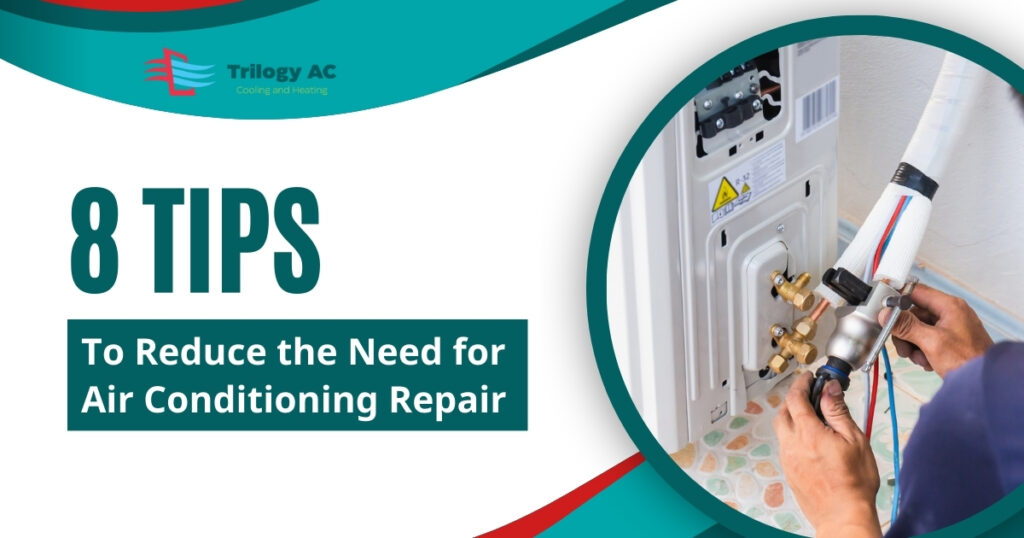An air conditioning repair can strain your household budget, but the need for AC repair can be reduced in a few simple ways. Most of these are simple enough to handle yourself. Costly surprises aren’t always inevitable. The following tips can help you save money on repairs and operating costs over the life of the system.
- Follow Recommendations for Changing/Cleaning Air Filters
- Be Mindful of How You Set the Thermostat
- Keep the Outdoor Unit Clean and Unobstructed
- Minimize Heat Gain In Your Home
- Check Your Ductwork for Sealing Issues
- Improve the Insulation In Your Home
- Install Energy-Efficient Windows
- Schedule Annual Preventative Maintenace with Your Local HVAC Contractor
1. Follow Recommendations for Changing/Cleaning Air Filters
Depending on the filter, it should be replaced or cleaned every 60 to 90 days (but pleated and electrostatic types can last six months or longer). A replaceable filter can be cleaned by removing it and either vacuuming the surface of the media or rinsing it under running water. Reinstall the filter once it’s clear and dry.
When changing a filter, replace it with one of the same size and type. Make sure it’s installed in the direction of the arrows, which typically indicate airflow toward the blower. Follow any other recommendations provided by the AC or filter manufacturer.
Maintaining the air filter reduces the need for air conditioning repair because accumulated debris can block airflow. This reduces efficiency and forces the AC to work harder to generate cool air. Also, particles and other contaminants can enter the system and damage delicate parts. Increased wear and tear can eventually lead to breakdowns and costly service calls.
The air filter mainly protects your AC system. However, a dirty filter can cause inefficiencies that reduce indoor air quality. Dust and allergens may accumulate and make the air less healthy to breathe.
Avoiding these issues takes just a few minutes of your time.
2. Be Mindful of How You Set the Thermostat
Setting the thermostat to the right temperature helps you stay comfortable and save on energy costs. It also protects your air conditioning system from damage that can shorten its lifespan. Setting the temperature too low can overwork your AC unit.
The optimal temperature to set an air conditioner to is 78℉, which provides a balance between comfort (for most people) and energy efficiency. You can also reduce the need for AC repair at the thermostat in the following ways:
- Increase the temperature setting when away from home.
- Check the temperature setting monthly; if the set and actual temperatures don’t match, call an HVAC contractor.
- Upgrade to a smart thermostat, which reduces the demand on your AC.
3. Keep the Outdoor Unit Clean and Unobstructed
Outdoor condenser units are built to be strong and durable. However, exposure to the elements can take a toll. A condenser unit must have sufficient airflow to work properly. Its components must be clean. Otherwise, low airflow can reduce cooling performance by preventing the release of heat absorbed from your home.
In general, cleaning the outdoor AC unit is easy. Brush away leaves, dirt, twigs, branches, and other debris. If the coils get dirty, rinse them with a garden hose set on low pressure. Bent coil fins can be straightened with a fin comb. These tasks can prevent the need for air conditioning repair, but call for help if there’s a blocked drain, damaged fan, or system overheating.
4. Minimize Heat Gain In Your Home
Since your AC unit provides cool air by absorbing heat, having more heat in your home makes it work harder. You can reduce heat gain in several ways, including:
- Close Curtains and Blinds: Sunlight brings in ample heat that counteracts any cooling your AC provides. Curtains and blinds block it and keep your home cooler during the day.
- Turn Off Lights That Aren’t Needed: Lighting sources, especially incandescent lights, produce a lot of heat. However, any lights should be turned off when you’re not using them.
- Close Windows and Doors: Open windows and doors allow heat in and conditioned air to escape. By keeping them closed, you can reduce the cooling load on your AC.
- Turn On Ceiling Fans: While they don’t reduce air temperature, ceiling fans can make it feel a few degrees cooler on your skin, so you don’t have to turn the AC as low.
- Install an Attic Fan: An attic fan removes trapped heat and pulls in cooler air, allowing your AC to reach the desired temperature more quickly. Solar-powered models are available that won’t increase your power bill.
- Avoid Using Heat-Producing Appliances During the Day: Ovens, stoves, dryers, dishwashers, and other appliances should be used during cooler hours. Otherwise, they can add heat that strains your AC system.
5. Check Your Ductwork for Sealing Issues
Loose, cracked, and poorly insulated ducts can leak conditioned air. This forces your AC unit to compensate and overwork itself. Aside from reducing efficiency, the effects can cause damage that requires air conditioning repair. Call for help if you notice exposed ducts are separated, corroded, or have holes or other damage or there’s reduced airflow and other AC performance issues.
There are DIY duct sealing methods, but they’re just temporary. A professional can use permanent, non-invasive strategies to make ductwork airtight. They can also improve insulation and provide duct cleaning to effectively remove dust, mold, allergens, dander, and other substances that can reduce indoor air quality (duct cleaning is recommended every 3 to 5 years).
6. Improve the Insulation In Your Home
Wall and ceiling insulation can prevent AC damage. Improving, updating, or replacing insulating materials can make your home more airtight. Insulation prevents cool air from escaping during the summer months and holds warm air in during the winter. It’s not just the insulation around rooms you occupy that’s important. Also, consider insulation improvements in your basement, garage, and attic.
7. Install Energy-Efficient Windows
Heat gain and heat loss through windows can significantly reduce your home’s energy efficiency and strain your AC. Older, uninsulated, or leaky windows may be costing you more than you think. Sometimes, adding weatherstripping around the edges or re-caulking potential leak spots around window frames can help. However, modern windows can include various features and options that improve HVAC efficiency.
8. Schedule Annual Preventative Maintenace with Your Local HVAC Contractor
Preventative maintenance is one of the most effective ways to avoid expensive air conditioning repairs. Every year, an HVAC technician should inspect the system. They can clean it and check for issues with airflow, blower components, or electrical parts. Prompt fixes and adjustments can protect larger components from early failure. The effects of dirt, a lack of lubrication, and wear and tear can be mitigated to prevent damage.
Aside from addressing and preventing potential problems, a technician can also provide advice. If efficiency improvements can be made, they may recommend updating insulation, cleaning or sealing ductwork, or considering a more effective air filtration solution. These can improve your comfort and reduce the need for costly air conditioning repairs in the future.
Schedule Air Conditioning Services with Trilogy AC
Our highly skilled technicians provide professional AC installation, maintenance, and repair. They can keep your system running at peak efficiency and are available 24/7 in case of an AC emergency. Leave it to us to inspect, clean, and test your AC system annually. We also check refrigerant levels, lubricate moving parts, calibrate thermostats, test safety controls, and evaluate electrical parts, wires, and connections to reduce the need for air conditioning repair.
To learn more and schedule air conditioning services in Houston, Katy, Cypress, Sugar Land, Woodlands, and surrounding areas, call (832) 730-5047








